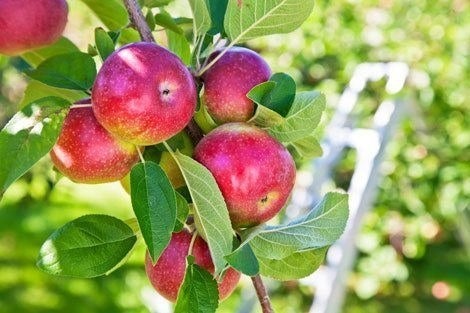For immediate release: March 30, 2015
Boston, MA – Men who ate fruits and vegetables with higher levels of pesticide residues—such as strawberries, spinach, and peppers—had lower sperm count and a lower percentage of normal sperm than those who ate produce with lower residue levels, according to a new study by researchers at Harvard T.H. Chan School of Public Health. It is the first study to look at the connection between exposure to pesticide residues from fruits and vegetables and semen quality.
The study will appear online March 30, 2015 in the journal Human Reproduction.
“To our knowledge, this is the first report to link consumption of pesticide residues in fruits and vegetables, a primary exposure route for most people, to an adverse reproductive health outcome in humans,” said Jorge Chavarro, assistant professor of nutrition and epidemiology and the study’s senior author.
Multiple studies have shown that consuming conventionally grown fruits and vegetables results in measurable pesticide levels in urine. Other studies have uncovered associations between occupational and environmental exposure to pesticides and lower semen quality. But only a few studies have linked consumption of pesticide residues in food to health effects, and none had looked at the effects on semen quality.
The researchers used data from 155 men enrolled in the Environment and Reproductive Health (EARTH) study, an ongoing National Institute of Environmental Health Sciences-funded study at a fertility center in Boston. Data included 338 semen samples provided during 2007–2012 and validated survey information about participants’ diets. The researchers classified fruits and vegetables according to whether they contained high amounts of pesticide residues (such as peppers, spinach, strawberries, apples, and pears) or low-to-moderate amounts (such as peas, beans, grapefruit, and onions), based on data from the U.S. Department of Agriculture Pesticide Data Program. They then adjusted for factors such as smoking and body mass index—both known to affect sperm quality—and looked for connections between the men’s intake of produce with pesticide residue and the quality of their sperm.
The results showed that men who ate greater amounts of fruits and vegetables with higher levels of pesticide residue—more than 1.5 servings per day—had 49% lower sperm count and 32% lower percentage of normal sperm than men who ate the least amounts (less than 0.5 serving per day). They also had a lower sperm count, lower ejaculate volume, and lower percentage of normal sperm.
The men who ate the most fruits and vegetables with low-to-moderate levels of pesticide residue had a higher percentage of normal sperm compared with those who ate less fruits and vegetables with low-to-moderate levels.
“These findings should not discourage the consumption of fruit and vegetables in general,” said Chavarro. “In fact, we found that consuming more fruits and vegetables with low pesticide residues was beneficial. This suggests that implementing strategies specifically targeted at avoiding pesticide residues, such as consuming organically-grown produce or avoiding produce known to have large amounts of residues, may be the way to go.”
Other Harvard Chan School researchers involved in the study included lead author Yu-Han Chiu, Myriam Afeiche, Audrey Gaskins, Paige Williams, and Russ Hauser.
Funding for the study came from the National Institute of Environmental Health Sciences, National Institutes of Health grants R01 ES009718, R01 ES022955, P30 ES000002, and P30 DK046200, and Ruth L. Kirschstein National Research Service Award T32 DK007703-16.
“Fruit and vegetable intake and their pesticide residues in relation to semen quality among men from a fertility clinic,” Y.H. Chiu, M.C. Afeiche, A.J. Gaskins, P.L. Williams, J.C. Petrozza, C. Tanrikut, R. Hauser, and J.E. Chavarro, Human Reproduction, March 30, 2015, doi:10.1093/humrep/dev064
Read a commentary on the study in the journal: “Is dietary pesticide exposure related to semen quality? Positive evidence from men attending a fertility clinic,” Hagai Levine, Shanna H. Swan, Icahn School of Medicine at Mount Sinai
Visit the Harvard Chan website for the latest news, press releases, and multimedia offerings.
For more information:
Marge Dwyer
mhdwyer@hsph.harvard.edu
617.432.8416
photo: iStockphoto.com
###
Harvard T.H. Chan School of Public Health brings together dedicated experts from many disciplines to educate new generations of global health leaders and produce powerful ideas that improve the lives and health of people everywhere. As a community of leading scientists, educators, and students, we work together to take innovative ideas from the laboratory to people’s lives—not only making scientific breakthroughs, but also working to change individual behaviors, public policies, and health care practices. Each year, more than 400 faculty members at Harvard Chan teach 1,000-plus full-time students from around the world and train thousands more through online and executive education courses. Founded in 1913 as the Harvard-MIT School of Health Officers, the School is recognized as America’s oldest professional training program in public health.
